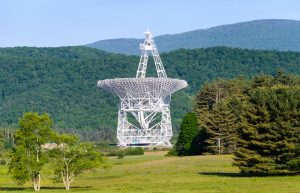
U.S. Sen. Shelley Moore Capito (R-WV) and U.S. Rep. Evan Jenkins (R-WV) led bipartisan efforts on Tuesday to clarify the process for submitting public comment on the future of Green Bank Observatory in West Virginia.
The National Science Foundation (NSF) will hold two public meetings on Nov. 9 and a public comment period on proposed changes to the Green Bank Observatory, a radio astronomy and educational facility that features the 100-meter diameter Green Bank Telescope.
“This facility is such a point of pride for many West Virginians, in addition to being an economic driver for the community,” Capito said. “I’ve been proud to support Green Bank Observatory and astronomy research through my position on the Senate Appropriations Committee, and I hope all West Virginians will join me in fighting for its future by attending a public meeting and submitting written comments.”
The NSF invests approximately $8 million in the facility annually, but the foundation said it is conducting meetings to obtain feedback on proposed operational changes due to funding constraints.
The preliminary alternatives the NSF is weighing include mothballing of the facilities, deconstruction and site restoration, reducing the foundation’s funding scope, or taking no action and continuing to invest in the observatory’s science-focused operations.
“The Green Bank Observatory employs West Virginians, gives our children incredible opportunities and brings millions in investments to our state,” Jenkins said.
Green Bank Observatory generates about $30 million for the local economy each year.
U.S. Sen. Joe Manchin (D-WV) also encouraged West Virginians to attend the public meeting, adding that the observatory has contributed to the area’s scientific, educational and economic well being for more than a half century.



